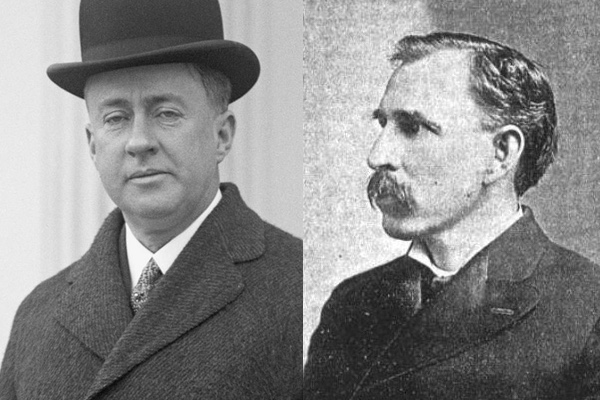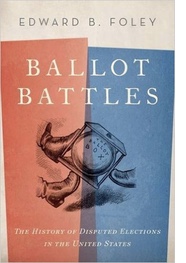Think Bush v. Gore Was Contentious? There’s Another Election Where the Rival Candidate was Shot and Killed.

Democrat J. C. W. Beckham and Republican William S. Taylor
When Americans think of disputed elections, they undoubtedly think of the 2000 presidential election. But there have been major disputed elections throughout American history, both before Bush v. Gore and since, some of the most significant being races for governor.
 New York’s gubernatorial election of 1792,
when John Jay ran as the Federalist challenger to the Jeffersonian incumbent
George Clinton, was the one that caught the Founding Fathers (including Jay
himself) by surprise—because they had not realized how intense the partisan
conflict could be over the counting of ballots that would the yield the prize
of controlling the chief executive office of a major state. Massachusetts
learned a similar lesson in 1806, when the Jeffersonians were tempted to steal
the governorship from the Federalists through a disingenuous manipulation of
vote-counting rules—until the public outcry was so great that they backed down
in shame.
New York’s gubernatorial election of 1792,
when John Jay ran as the Federalist challenger to the Jeffersonian incumbent
George Clinton, was the one that caught the Founding Fathers (including Jay
himself) by surprise—because they had not realized how intense the partisan
conflict could be over the counting of ballots that would the yield the prize
of controlling the chief executive office of a major state. Massachusetts
learned a similar lesson in 1806, when the Jeffersonians were tempted to steal
the governorship from the Federalists through a disingenuous manipulation of
vote-counting rules—until the public outcry was so great that they backed down
in shame.
One disputed election for governor, however, stands out above all others in terms of its significance and its ugliness: Kentucky’s election of 1899. It resulted in the assassination of the Democratic candidate while the parties were fighting over who had won. It also resulted in a U.S. Supreme Court precedent, Taylor v. Beckham, which established the federal judiciary’s hands-off approach regarding vote-counting disputes—an approach that prevailed throughout the twentieth century, until Bush v. Gore repudiated it.
Partisan polarization at the end of the nineteenth century makes today’s division between Democrats and Republicans look mild by comparison. In Kentucky back then, partisan hatred was especially acute, a political version of the incessant warring between Hatfields and McCoys. In 1899, electoral combat got out of hand.
The Democratic candidate for governor was William Goebel, a populist leader in the state’s legislature. His Republican opponent was William Taylor, the state’s attorney general. Election Day was marred by acts of intimidation and allegations of fraud on both sides. Initial returns showed Taylor winning by about 2,000 votes, but the state’s legislature had the final authority for declaring the winner, and the legislature was controlled by Democrats. As the legislature convened to exercise its power, armed militia on both sides descended upon the state’s capitol in Frankfurt, some coming from surrounding hill towns.
In the midst of this tense atmosphere, Goebel was walking across the statehouse grounds when he was struck by a bullet fired from the office of the secretary of state, a Republican. He died four days later, but not before he was sworn in based on a declaration of victory from the legislature. His martyrdom only intensified the Democrats’ intent to install in office Goebel’s running mate, J.C.W. Beckham.
Meanwhile, the Republicans were attempting to have the courts recognize Taylor’s claim to the governorship, based on the initial count of the ballots. The Kentucky Supreme Court, however, rebuffed the claim on the ground that the state’s legislature had exclusive authority under the state’s constitution to settle the outcome of the election. True, the legislature could commit a “great injustice” in distorting the count of votes based on partisanship, the court acknowledged. But nothing could be done to correct this injustice if the constitution was explicit in giving the legislature this power.
The U.S. Supreme Court, in an 8-1 decision, also refused to get involved. Relying on the so-called “political question doctrine,” the Court in the Kentucky case ruled that the Fourteenth Amendment provided no additional basis for federal courts to protect the counting of ballots from improper partisan manipulation. The Court’s opinion, named Taylor v. Beckham after the two claimants to the governor’s office, announced: “We must decline to take jurisdiction on the ground of deprivation of rights embraced by the Fourteenth Amendment.” The only recourse was to the state’s legislature, the Court said, no matter how subversive of the actual count of the votes that partisan institution might be.
The Court’s decision provoked a single dissent from Justice John Marshall Harlan. From Kentucky, Harlan’s views of the 1899 election might have been affected by local knowledge. On the other hand, this local knowledge prompted him to decry electoral thievery when it was being perpetrated by politicians thoroughly familiar to him. To be sure, Justice Harlan did not attempt to exonerate the assassination of political opponent. At the same time, however, he insisted that two wrongs did not make a right: the assassination of Goebel, the Democrat, did not justify the Democrats in the legislature stealing the election in retaliation.
Harlan did not prevail in that case, but maybe he should have. The majority opinion Taylor v. Beckham caused a century of self-abnegation by the federal courts in vote-counting cases. The most consequential implication of this hands-off policy occurred in 1948, where Lyndon Johnson won a U.S. Senate race as a result of blatant ballot-box stuffing. His opponent, former Texas Governor Coke Stevenson, went to federal court in an effort to undo this electoral fraud, but Justice Hugo Black ordered the federal courts to dismiss the case because the precedent of Taylor v. Beckham precluded federal court jurisdiction. No matter how flagrant the electoral fraud, there is no role for the federal courts to provide a remedy according to this precedent.
This view prevailed until Bush v. Gore. The theory of the Court’s intervention in that case is the same as Harlan’s dissent in Taylor v. Beckham. The majority of the Court in Bush v. Gore perceived Florida officials as manipulating the process in a way designed to promote a preferred partisan outcome. Whether or not one agrees with the particular way in which the Court handled this idea in Bush v. Gore, one must wonder whether on balance the nation is better off if the federal courts can intervene when state officials distort the vote-counting process for partisan purposes.
Thus, one can view Bush v. Gore as vindicating Harlan’s lone dissent in Taylor v. Beckham. History shows that partisans will endeavor to manipulate vote-counting in their favor. Harlan had the vision that the federal Constitution, properly interpreted, constrains these partisan manipulations—and that the federal judiciary is an appropriate institution to enforce this constrain. Over the twenty-first century, our nation will learn whether Harlan’s vision was indeed prophetic.